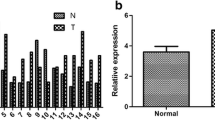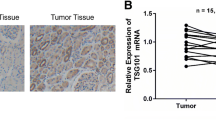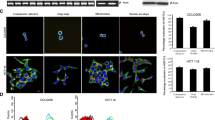Abstract
Renal cell carcinoma (RCC) represents one of the most resistant tumors to radiotherapy and chemotherapy. Current therapies for the RCC patients are limited owing to lack of diagnosis and therapeutic treatments. Testis-specific heat-shock protein 70-2 (HSP70-2), a member of HSP70 chaperone family, has been shown to be associated with various cancers. In the present study, we investigated the putative role of HSP70-2 in various malignant properties of the RCC cells. HSP70-2 messenger RNA (mRNA) and protein expression was investigated in A704, ACHN, and Caki-1 cells derived from the RCC patients. We assessed the expression of HSP70-2 gene and protein by reverse transcription-polymerase chain reaction (RT-PCR) and Western blotting, respectively. The expression of HSP70-2 protein was further validated by performing indirect immunofluorescence (IIF) and flow cytometry. The malignant properties of high-grade invasive A704 and Caki-1 cells, such as cellular proliferation, colony formation, migration, invasion, and wound healing, were evaluated by silencing the expression of HSP70-2 gene in these cells. Statistical significance was defined using Student’s t test. Our RT-PCR and Western blotting data showed the expression of HSP70-2 in all RCC cells. Our results showed that HSP70-2 was predominantly expressed in cytoplasm and found to be colocalized with endoplasmic reticulum, mitochondria, Golgi body, and plasma membrane but not the nuclear envelope. Knockdown of HSP70-2 expression with specific short hairpin RNA (shRNA) demonstrated significant reduction in cell growth and colony formation. Further, a marked reduction in cell migration and invasion was also observed, indicating the potential role of HSP70-2 in metastasis. Collectively, our data suggest that HSP70-2 plays a key role in cancerous growth and invasive potential of RCC cells. Thus, HSP70-2 could serve as a novel potential therapeutic target for the RCC.







Similar content being viewed by others
Change history
05 May 2022
A correction to this article is available at https://doi.org/10.3233/TUB-219008
References
Ljungberg B, Campbell SC, Cho HY, et al. The epidemiology of renal cell carcinoma. Eur Urol. 2011;60:615–21.
Farias-Cortésa JD, Scavuzzob A, Jiménez-Ríosb MA, et al. Kidney cancer metastatic to the testis. Rev Mex Urol. 2014;74:48–54.
Garg M, Kanojia D, Seth A, et al. Heat-shock protein 70-2 (HSP70-2) expression in bladder urothelial carcinoma is associated with tumour progression and promotes migration and invasion. Eur J Cancer. 2010;46:207–15.
Garg M, Kanojia D, Saini S, et al. Germ cell-specific heat shock protein 70-2 is expressed in cervical carcinoma and is involved in the growth, migration, and invasion of cervical cells. Cancer. 2010;116:3785–96.
Suri A, Saini S, Sinha A, et al. Cancer testis antigens: a new paradigm for cancer therapy. Oncoimmunology. 2012;1:1194–6.
Zendman AJ, Ruiter DJ, Van GN. Cancer/testis‐associated genes: identification, expression profile, and putative function. J Cell Physiol. 2003;194:272–88.
Garg M, Kanojia D, Khosla A, et al. Sperm-associated antigen 9 is associated with tumor growth, migration, and invasion in renal cell carcinoma. Cancer Res. 2008;68:8240–8.
Saini S, Agarwal S, Sinha A, et al. Gene silencing of A-kinase anchor protein 4 inhibits cervical cancer growth in vitro and in vivo. Cancer Gene Ther. 2013;20:413–20.
Hendrick JP, Hart FU. Molecular chaperone functions of heat shock proteins. Annu Rev Biochem. 1993;62:349–84.
Rohde M, Daugaard M, Jensen MH, et al. Members of the heat-shock protein 70 family promote cancer cell growth by distinct mechanisms. Genes Dev. 2005;19:570–82.
Gurbuxani S, Bruey JM, Fromentin A, et al. Selective depletion of inducible HSP70 enhances immunogenicity of rat colon cancer cells. Oncogene. 2001;20:7478–85.
Nylandsted J, Wick W, Hirt UA, et al. Eradication of glioblastoma, and breast and colon carcinoma xenografts by Hsp70 depletion. Cancer Res. 2002;62:7139–42.
Son WY, Hwang SH, Han CT, et al. Specific expression of heat shock protein HspA2 in human male germ cells. Mol Hum Reprod. 1999;5:1122–6.
Zhu D, Dix DJ, Eddy EM. HSP 70-2 is required for CDC2 kinase activity in meiosis I of mouse spermatocytes. Development. 1997;124:3007–14.
Kanojia D, Garg M, Saini S, et al. Sperm associated antigen 9 plays an important role in bladder transitional cell carcinoma. PLoS One. 2013;8:e81348.
Motzer RJ, Hutson TE, Tomczak P, et al. Overall survival and updated results for sunitinib compared with interferon alfa in patients with metastatic renal cell carcinoma. J Clin Oncol. 2009;27:3584–90.
International Agency for Research on Cancer: Globocan 2012: Estimated cancer incidence, mortality and prevalence worldwide in 2012. [http://globocan.iarc.fr/Pages/fact_sheets_population.aspx].
Parcellier A, Gurbuxani S, Schmitt E, et al. Heat shock proteins, cellular chaperones that modulate mitochondrial cell death pathways. Biochem Biophys Res Commun. 2003;304:505–12.
Galluzzi L, Giordanetto F, Kroemer G. Targeting HSP70 for cancer therapy. Mol Cell. 2009;36:176–7.
Xia LM, Tian DA, Zhang Q, et al. Inhibition of HSP70-2 expression by RNA interference induces apoptosis of human hepatocellular carcinoma cells. Zhonghua Gan Zang Bing Za Zhi. 2008;16:678–682.
Dix DJ, Allen JW, Collins BW, et al. HSP70-2 is required for desynapsis of synaptonemal complexes during meiotic prophase in juvenile and adult mouse spermatocytes. Development. 1997;124:4595–603.
Shin BK, Wang H, Yim AM, et al. Global profiling of the cell surface proteome of cancer cells uncovers an abundance of proteins with chaperone function. J Biol Chem. 2003;278:7607–16.
Liu X, Yan Z, Huang L, et al. Cell surface heat shock protein 90 modulates prostate cancer cell adhesion and invasion through the integrin-β1/focal adhesion kinase/c-Src signaling pathway. Oncol Rep. 2011;25:1343–51.
Cancer Genome Atlas Research Network. Comprehensive molecular characterization of clear cell renal cell carcinoma. Nature. 2013;499:43–9.
Shin KD, Lee MY, Shin DS, et al. Blocking tumor cell migration and invasion with biphenyl isoxazole derivative KRIBB3, a synthetic molecule that inhibits Hsp27 phosphorylation. J Biol Chem. 2005;280:41439–48.
Gibert B, Eckel B, Gonin V, et al. Targeting heat shock protein 27 (HspB1) interferes with bone metastasis and tumour formation in vivo. Br J Cancer. 2012;107:63–70.
Zhu Z, Xu X, Yu Y, et al. Silencing heat shock protein 27 decreases metastatic behavior of human head and neck squamous cell cancer cells in vitro. Mol Pharm. 2010;7:1283–90.
Du XL, Jiang T, Wen ZQ, et al. Silencing of heat shock protein 70 expression enhances radiotherapy efficacy and inhibits cell invasion in endometrial cancer cell line. Croat Med J. 2009;50:143–50.
Ong PY, Thuya WL, Kong LR, et al. Hsp27 expression does not affect anti-cancer drug sensitivity but promote cell proliferation of lung squamous cell carcinoma in vitro. J Pharmacol Drug Metab. 2014;1:1–3.
Kanagasabai R, Karthikeyan K, Vedam K, et al. Hsp27 protects adenocarcinoma cells from UV-induced apoptosis by Akt and p21-dependent pathways of survival. Mol Cancer Res. 2010;8:1399–412.
Acknowledgments
This work is supported by grants from Indo-UK Cancer Research Program, Centre for Molecular Medicine, NII-core funding, Department of Biotechnology, Government of India. We also thank technical support by Mrs. Rekha Rani, National Institute of Immunology, New Delhi, India, for confocal microscopy. We acknowledge Dr. V. Kumar, Senior Staff Scientist, International Centre for Genetic Engineering and Biotechnology, New Delhi, India, for critical reading and editing of this manuscript.
Conflicts of interest
None
Author’s contributions
SS performed HSP 70-2, carried out experiments, and drafted the manuscript. AS conceived the study, designed the experiments, and edited the manuscript.
Author information
Authors and Affiliations
Corresponding author
Rights and permissions
About this article
Cite this article
Singh, S., Suri, A. Targeting the testis-specific heat-shock protein 70-2 (HSP70-2) reduces cellular growth, migration, and invasion in renal cell carcinoma cells. Tumor Biol. 35, 12695–12706 (2014). https://doi.org/10.1007/s13277-014-2594-5
Received:
Accepted:
Published:
Issue Date:
DOI: https://doi.org/10.1007/s13277-014-2594-5




